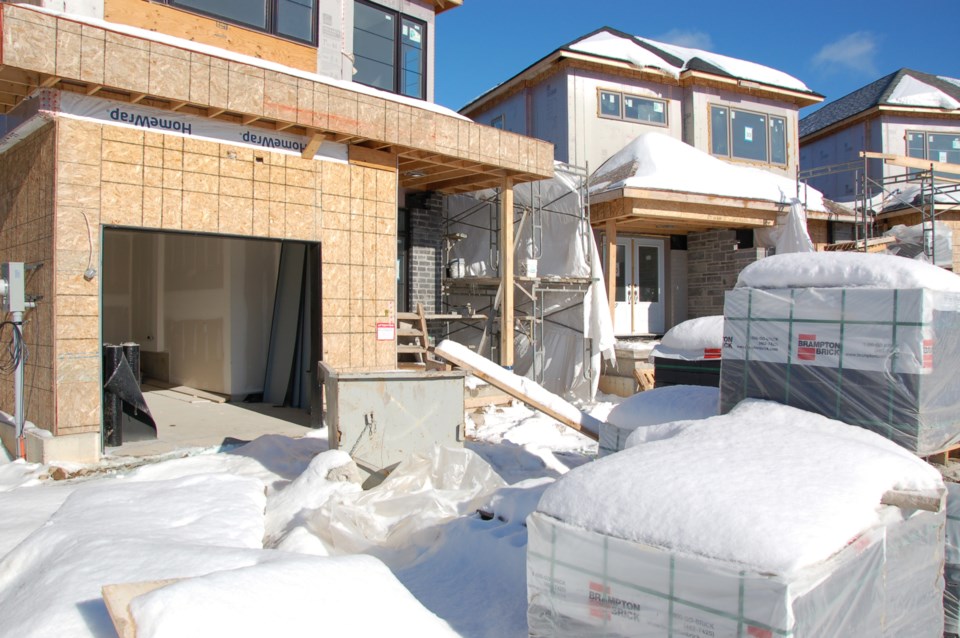A provincial promise to ensure municipalities are “kept whole” from the impacts of new housing regulations comes as welcome news to Mayor Cam Guthrie, but he’s left with several questions and continues to push for a more collaborative approach to handling the housing crisis.
“At least the government is listening to us,” Guthrie, who serves as chair of Ontario Big City Mayors, said. “Finally the door has been opened for some movement on this issue.
“Not just in regards to the financial hit, but also to the relationship hit that many of us have felt wasn’t necessary to get to this point. We are and have always been willing contributors … to work in a united way toward these housing goals that we know Ontarians need.”
Since Bill 23, the More Homes Built Faster Act, was introduced in late October, municipalities throughout the province, including Guelph, have spoken out about the potential loss of millions of dollars in development charges and parkland dedication fees from new housing projects.
The prospective changes could result in a two per cent property tax increase in Guelph, city staff recently told council.
In response, Minister of Municipal Affairs and Housing Steve Clark issued a letter Wednesday stating “there should be no funding shortfall for housing enabling infrastructure as a result of Bill 23, provided municipalities achieve and exceed their housing pledge levels and growth targets.”
“What does that mean?” wonders Guthrie. “Does that mean if there’s growth-related projects that aren’t related directly to housing, like libraries or rec. centres or other infrastructure that’s required for growth, does that mean that we won’t be made ‘whole’ on those items?”
Guthrie criticized the provincial government for moving ahead with the legislation despite the absence of a federal funding commitment to help municipalities recover lost revenue, noting Clark states in his letter that municipalities are expected to apply for federal housing dollars.
“That’s not a sure thing,” the mayor said of being approved for funding.
In addition, the province is launching a third-party audit of select municipalities to get a “factual understanding of their finances, including their reserve funds and development charge administration” – another head-scratcher for Guthrie.
“First of all, you don’t know what ‘select municipalities’ means, which is part of the clarity the mayors are really looking for,” he said. “A lot of these new steps that are being asked of are really steps that would not have even been necessary to begin with if we had just worked collaboratively from the get-go.”
Today OBCM was pleased to receive a letter from Minister @SteveClarkPC in response to concerns on #Bill23. Click the link below to read Chair @CamGuthrie's statement. We look forward to working w/ the province to build more homes for Ontarians. #onpoli https://t.co/bhf1eiwsd9 pic.twitter.com/y1VfDIoIBl
— Ontario’s Big City Mayors (@ONBigCityMayors) December 1, 2022
That collaboration is key to solving the housing crisis, Guthrie believes. He’s calling on the government to launch the previously planned Housing Implementation Table, which would see various levels of government sit down with the development industry and housing providers to discuss the challenges and come up with solutions.
“That table has never met,” Guthrie said.
Rather, Bill 23 was introduced and municipalities were asked to provide feedback – an opportunity open to the public in general.
The legislation aims to help create 1.5 million new housing units in Ontario by 2031, with 18,000 of those allocated to Guelph.
“Whether or not the money to make municipalities ‘whole’ is going to remain on the back of the municipal tax base or if it’s coming from the provincial government or if it’s coming from the federal government, it’s still coming, ultimately, from the taxpayers’ wallet,” Guthrie said.
“There’s still more collaboration and consultation that needs to occur.”
